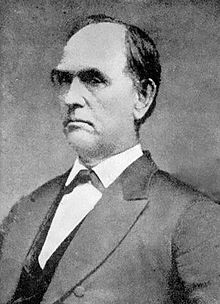Augustus C. Dodge
| Augustus Caesar Dodge | |
|---|---|
 |
|
| United States Ambassador to Spain | |
|
In office February 22, 1855 – March 12, 1859 |
|
| President | Franklin Pierce |
| Preceded by | Pierre Soulé |
| Succeeded by | William Preston |
|
United States Senator from Iowa |
|
|
In office December 7, 1848 – February 22, 1855 |
|
| Preceded by | (none) |
| Succeeded by | James Harlan |
| Delegate to the U.S. House of Representatives from Iowa Territory's at-large congressional district | |
|
In office October 28, 1840 – December 28, 1846 |
|
| Preceded by | William W. Chapman |
| Succeeded by | Serranus Clinton Hastings (from Iowa's at-large congressional district) |
| Personal details | |
| Born |
January 2, 1812 Ste. Genevieve, Missouri, US |
| Died | November 20, 1883 (aged 71) Burlington, Iowa, US |
| Political party | Democratic |
| Profession | Politician |
| Military service | |
| Service/branch | United States Army |
| Battles/wars | Black Hawk War |
Augustus Caesar Dodge (January 2, 1812 – November 20, 1883) was one of the first set of United States Senators to represent the state of Iowa after it was admitted to the Union as a state in 1846. Dodge, a Democrat, had also represented Iowa Territory in Congress as its delegate to the U.S. House of Representatives from 1840 to 1846.
He was born in what is now Ste. Genevieve, Missouri (then in Louisiana Territory). Self-educated, he moved to Illinois in 1827, settled in Galena, and was employed there in various capacities in his father's lead mines. He served in the Black Hawk War and other Indian wars. In 1837, he moved to what is now Burlington, Iowa (then in Wisconsin Territory), where he served as register of the land office until 1840.
Congress created Iowa Territory in 1838, from what was formerly the Iowa District of Wisconsin Territory. As a result of the Act of March 3, 1839, the position of Iowa Territory's Delegate to the U.S. House would become vacant on October 27, 1840, and Dodge was elected to fill it. After initially serving in the Twenty-sixth United States Congress, he was re-elected in 1840 (to the Twenty-seventh Congress), 1842 (to the Twenty-eighth Congress), and 1844 (to the Twenty-ninth Congress). He served as delegate until Iowa became a state in December 1846, and his role was replaced by two voting Representatives.
...
Wikipedia
